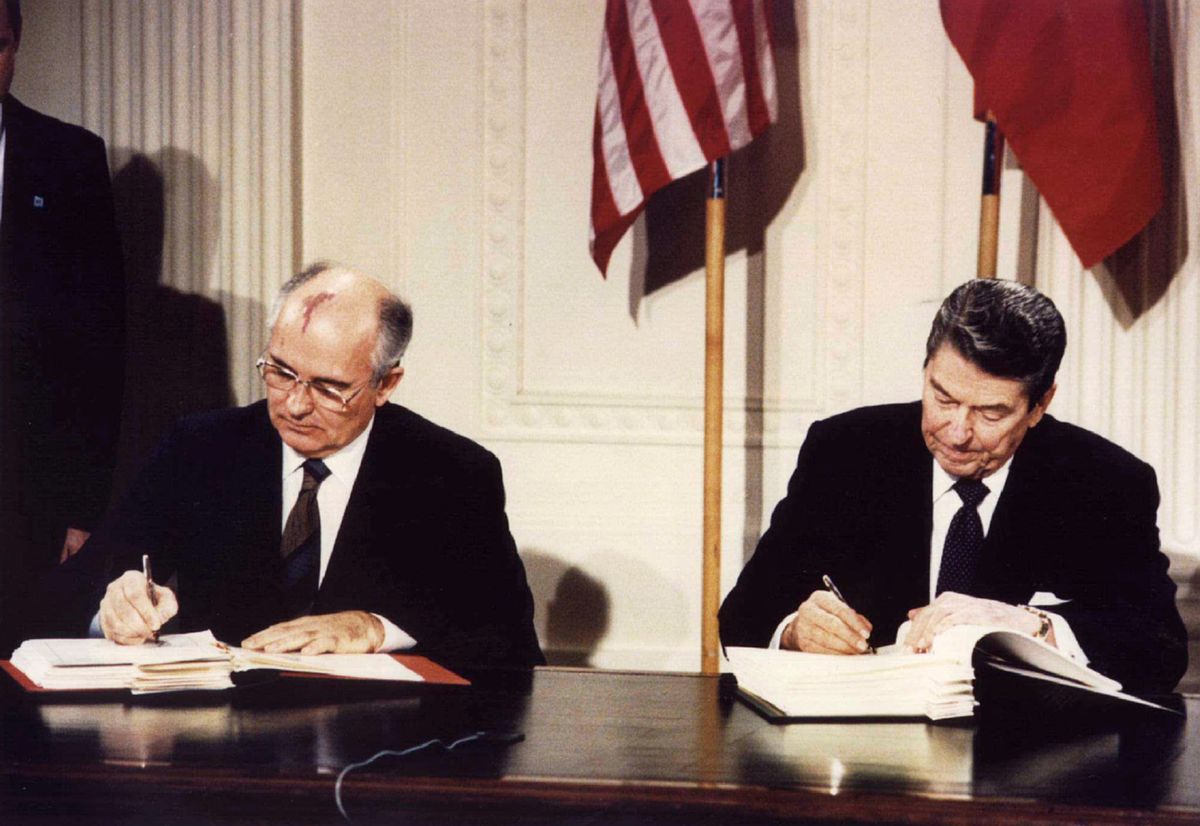US National Security Adviser John Bolton is in Moscow today, explaining to Russian President Vladimir Putin why the Trump Administration wants to ditch a major arms control treaty that dates from the waning days of the Cold War.
In 1987 – after years of concern about nuclear weapons buildups in and around Europe – the US and the Soviet Union signed the Intermediate Nuclear Forces treaty (INF), which forbade either country from producing or deploying ground-launched missiles with a range between 300 and 3,300 miles. It eliminated an entire class of dangerous weapons and was a mainstay of US-Russia ties for decades thereafter.
Today, it’s in trouble. For one thing, each side accuses the other of breaking the treaty’s rules. Since 2014, the US has warned that a new Russian missile, the NOVATOR, violates the pact, and NATO allies broadly agree. The Russians, meanwhile, say US missile defense systems and even unmanned drones represent violations.
Further complicating matters, the original agreement doesn’t apply to China, which has in recent years developed a huge arsenal of precisely the intermediate-range weapons that the INF treaty bans. That arsenal worries US allies in Asia, but it also concerns Russia, which shares a 2,600-mile land border with China.
So would leaving the deal be a good move for the US?
If yes, it’s because:- The Russians are committed to violating it anyway, so there’s no point in the US continuing to honor an agreement that limits its options.
- The treaty ties Washington’s hands in Asia: it makes it impossible for the US to counter China’s growing nuclear arsenal on an equal footing, since it prohibits Washington from developing precisely the weapons that China is producing en masse.
- Bring on a new arms race: just like last time, it’s one that the Russians would have a very hard time winning – the US defense budget is currently more than ten times Russia’s, and Moscow has actually had to trim its ambitions in recent years as sanctions and low oil prices hit economic growth.
If no, it’s because:
- Imperfect as it is, the treaty forces Russia to openly flout a binding international agreement if it wants to deploy these weapons in sensitive regions throughout Europe and Asia.
- The issue of matching China’s intermediate-range weapons is a red herring: the US is more than capable of protecting its Asian allies with air- or sea-borne nuclear weapons. Nothing in the existing treaty prevents the US from increasing those arsenals to face down Russian or Chinese threats. If anything, the INF pact is lopsided in favor of the US.
- Tearing up the INF treaty would poison the atmosphere ahead of upcoming talks to renew another big treaty (New START) that limits the overall number of US and Russian nuclear arms. If INF and New START fall apart, a very scary nuclear arms race could quickly ensue.
Trump may of course simply be using this walkout threat as negotiating leverage to get the Russians to agree to milder revisions that everyone can live with. It also may scare the daylights out of the Europeans who – as even some of the treaty’s defenders have pointed out – should be doing much more to put pressure on Moscow about INF violations, given how much this issue affects the continent. (The range from 300 to 3,300 miles from Russia’s border encompasses all of Europe.)
It hardly seems likely that Bolton traveled all the way to Moscow just to deliver the final word that the US is out of the treaty. What he is telling Mr. Putin, however, will shed light on whether this is the end of the INF, or the beginning of new negotiations.



















